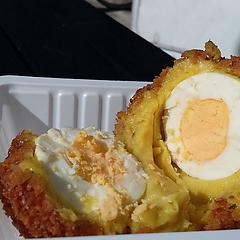Many people consider 'Going to the Chinese' as a family tradition in which Babi Pangang is one of the most famous dishes. The Chinese-Indonesian restaurant culture is characterised by the convergence of three cultures: the Indian, Chinese and Dutch culture. From the moment one enters a Chinese-Indonesian restaurant, one is more or less on a journey. It is a place infused with Chinoiserie, an environment inspired by the Western view of Asia. The Chinese Indonesian restaurant culture involves several groups: the restaurant owners, the chefs, the restaurant visitors and the take-out customers.
The restaurant owner is always present in the business and often builds a relationship with his/her customers. The owner makes sure that the restaurant is in order and that it is, in many cases, open 7 days a week. The owner is often also the one behind the takeaway counter and serves the customers in the restaurant.
The chef usually comes to the shop early in the afternoon to prepare the food for the evening. As soon as an order is taken, it goes through the 'hatch' to the kitchen. In the kitchen, the chef carries out the order and once the food is ready, it is pushed through the 'hatch' into the restaurant.
Among restaurant visitors and take-out customers, the decision to 'go to the Chinese' is often triggered by a specific event. This varies from birthdays, 'just quickly', but good food, not feeling like cooking, a night out, a move, chores in the house or working overtime. The distinctive feature of the menu is that it includes specialities of the house, but also Chinese, Indonesian and even typically Dutch dishes, such as french fries for the children. Another characteristic is that the food is always ready fairly quickly and you get 'a lot for little'. When the food is taken out, it is wrapped up in grey paper and then put into a plastic bag. Before the ordered food is given to the customer, they are always asked if they would like some free sambal to go with it.
Description
Community
The Stichting Meer dan Babi Pangang (More than Babi Pangang Foundation) is committed to safeguarding the Chinese-Indonesian restaurant culture and giving it a future. Therefore it cooperates with, among others, the Vereniging Chinese-Aziatische Horeca Ondernemers (VCHO). The foundation's umbrella function is to strengthen the position of the Asian community in the Netherlands.
Consumers are generally unaware of the heritage of the Chinese-Indonesian restaurant culture, but a quick calculation shows that over 12,000,000 people visit the Chinese-Indonesian restaurant on an annual basis.
History
In 1911, the first Chinese arrived in the Netherlands, mostly as port workers. Subsequently, several Chinese eateries opened their doors in the 1920s. They served authentic Chinese dishes to provide Chinese people in the Netherlands with what they ate at home. After WWII and the independence of Indonesia, the tide turned for the Chinese. Many Indo-European migrants, Dutch soldiers and Indo-European people with a Chinese background came to the Netherlands. The Chinese restaurant owners saw this as a new target group and expanded their menu with dishes such as satay and nasi goreng. The restaurant owners recruited Indonesian 'kokkies' to prepare Indonesian dishes. The Chinese added the word Indonesian to Chinese and the Chinese-Indonesian restaurant was born: a fusion of three cultures. In the 1980s, 60% of the Dutch population ate out at the Chinese restaurant, 30% of them at least once a month. For many Dutch people, it was their first experience of eating out. Dishes such as satay, nasi goreng, noodles and babi pangang in particular became commonplace. Many dishes in the restaurants were adapted to the taste of the Dutch. The Chinese have also traditionally focused on the takeaway market, and they were the first in the Netherlands to do so.
In recent decades, the number of Chinese-Indonesian restaurants, especially in the big cities, has decreased. This is partly due to the generally rather heavy and fatty food that does not fit in with the growing need for healthy and light food and because of the rise of many Asian concepts, especially fast food related. In addition, the lack of sufficient Chinese chefs and the desire of Chinese parents for a 'better' future for their children are also reasons why the number of restaurants is declining.
Safeguarding
- Through their own online platform - meerdanbabipangang.nl - knowledge, goals and safeguard actions are shared in a permanent place to create awareness and familiarity.
- Babi pangang 2.0 will be created, a recipe that will be shared with the public and that will be composed by three well-known Dutch chefs with different cultural backgrounds.
- By working together with organisations such as Verhalenhuis Belvedère, they will ensure that there are ongoing events and activities to actively promote and make visible the intangible cultural heritage.
- By organising, among other things, folk cuisines with a focus on the dishes of the Chinese-Indonesian restaurants, they want to ensure that these dishes are not forgotten.
- Because the awareness must be created not only among the Chinese community, but also among the native Dutch population, simplified recipes for the dishes will be distributed so that people can make the food themselves at home.
- To make the heritage more visible, the National Babi Pangang Day will be organised, audio-visual productions will be made and (online) stories will be shared, offering people an opportunity to take action.
- Since the so-called wok agreement, concluded in 2014, the Asian catering sector has been allowed to employ only very limited numbers of chefs from Asia, which is why they will continue to draw attention to this issue and lobby, in cooperation with partners, for a better wok agreement.
- Because consumer tastes have changed, consumers will be made aware of the vegetarian options by means of reviews/articles/written recipes/sharing of vegetarian alternatives.
Contact
Stichting Meer dan Babi PangangAmsterdam
Noord-Holland
Netherlands
Website



